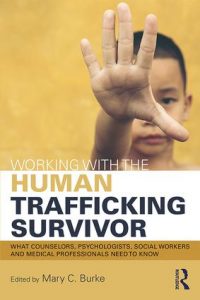Psychological Treatment: Reflections on a Psychoanalytic Perspective to Work with Human Trafficking
by Paola M. Contreras, PsyD
Abstract
In this chapter, the author discusses a range of psychoanalytic theories and philosophies that relate to the dynamics of human trafficking. She attempts to situate human trafficking in the intrapsychic and intersubjective space. The author deals with a review of the history of psychoanalysis and its challenges to respond to social issues. She draws on G. W. F. Hegel’s Master–Slave dialectic to outline the perpetration dynamics of human trafficking. The author also deals with reflections on how she has used a combined intersubjective and liberation psychology perspective to engage with individuals who have experienced exploitation. She highlights case examples of sex trafficking and trafficking for manual labor. The author describes the human trafficking experience. She also discusses thoughts on the unconscious and working with trauma. The author offers brief case examples of her clinical work with survivors of sex trafficking and trafficking for manual labor, as well as examples from the media.
Burke, Mary C. (2019). Working with the Human Trafficking Survivor: What Counselors, Psychologists, Social Workers and Medical Professionals Need to Know. New York and London: Routledge, pp. 61-80.
Link to Online Publication. The book and the chapter are available from the library.
About the Author:
Paola Michelle Contreras, PsyD, is a BPSI Candidate in psychoanalytic training and the 2019 Arthur R. Kravitz Award recipient (click here to watch her recent interview about her humanitarian work). Since 2006 Dr. Contreras has provided education and training to law enforcement, legal professionals, as well as national and international anti-trafficking organizations, advocating for legislation sensitive for survivors of human trafficking. She has published important articles and co-produced a short documentary on human trafficking. Dr. Contreras has recently won a grant through the International Psychoanalytic Association to study unconscious forces, such as attachment patterns, that may contribute to difficulties in leaving situations involving exploitation, trafficking, and prostitution. She is an Assistant Professor at William James College in Newton, and in addition to her teaching and advocacy, she has a private practice in Cambridge, Massachusetts.
About the Book:

Working with the Human Trafficking Survivor, fills a void in existing literature by providing students, faculty, and professionals in applied, helping disciplines, with a comprehensive text about human trafficking with a focus on clinical issues. This book gives an overview of the medical care, options for psychological treatment, and beyond. The book editor, Mary C. Burke, is an associate professor in the Department of Psychology and Counseling at Carlow University, where she is the program director of the doctoral program in Counseling Psychology. She has been involved in anti-human trafficking efforts since 2004 and is the founder of the Project to End Human Trafficking.
Previous Posts:
Rodrigo Barahona, PsyaD (2019). Unlaid Ghosts: A Discussion Of Maria Grazia Oldoini’s “Abusive Relations and Traumatic Development: Marginal Notes on a Clinical Case”. Psychoanalytic Quarterly, 88:2, 277-295.
Sarah L. Lusk, PhD (2019). A Psychoanalytic Approach to the Complexity of Understanding and Treating Patients with ADHD Beyond Childhood: The Experiences of Two Psychoanalytic Candidates. The Psychoanalytic Study of the Child, 72:1, 61-70.
Anthony D. Bram, PhD, ABAP, FABP (2019). The Subjective Impact of Separation and Divorce on a Latency-Aged Child and His Analysis. Psychoanalytic Study of the Child, 72:24-32.
Anna Ornstein, MD (2019). Six Million and One: a documentary. In Cinematic Reflections on the Legacy of the Holocaust: Psychoanalytic Perspectives, edited by Diana Diamond and Bruce Sklarew. Routledge, p. 40-50.
Click here to see a full archive of featured papers. All articles can be requested from the library.

